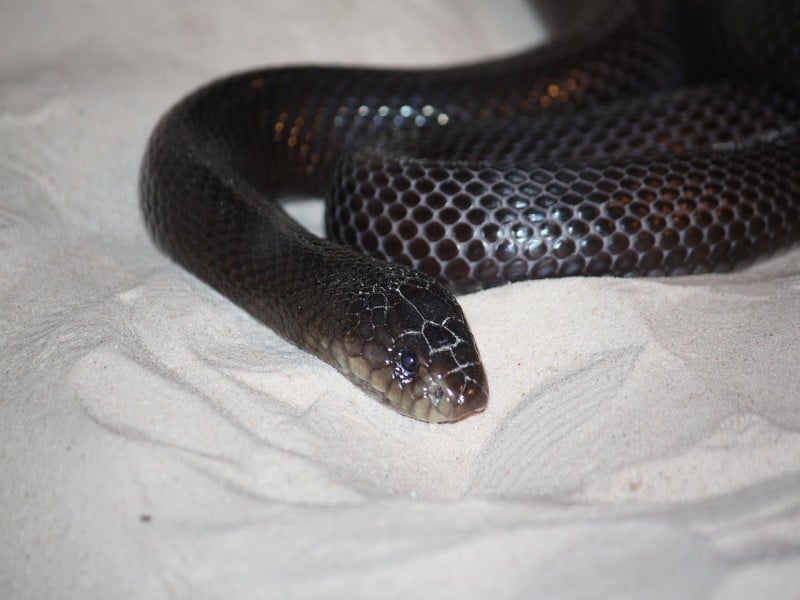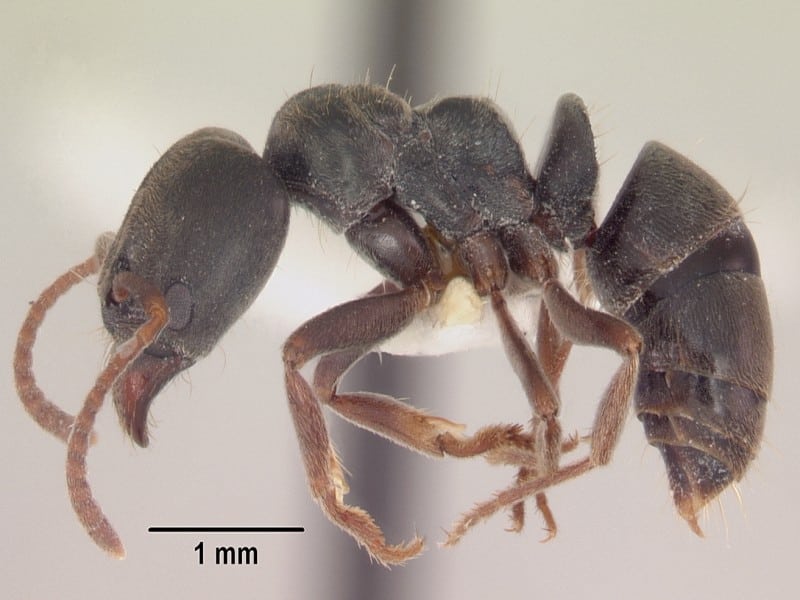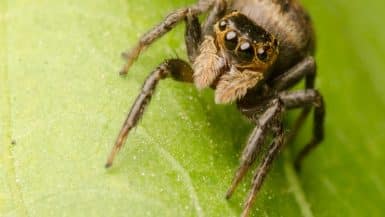
At the top of the Arabian Gulf, Kuwait has an allure of a country still untouched by over-tourism. Bordered by its neighboring countries of Saudi Arabia and Iraq, Kuwait may be a tiny country, but it also has a booming economy.
However, the country is not just glitz and glam. Most of Kuwait’s mainland is a flat, isolated desert, making it a perfect environment for native animals to thrive. From deadly scorpions to particularly aggressive badgers, visitors will find many dangerous animals in Kuwait.
You do not want your trip to Kuwait ruined by a chance animal encounter, so we have curated a list of animals you should watch out for. Knowledge is survival if you stumble across an unfamiliar animal in a foreign country, and we will provide you with just that. Here are our seven most deadly and dangerous animals in Kuwait.
Arabian fat-tailed scorpion (Androctonus Crassicauda)

Approximately nine species of scorpions found in Kuwait can give life-threatening stings. One of these is the Arabian fat-tailed scorpion.
Characterized by a typically dark color and its fat tail, the Arabian fat-tailed animal grows up to about 4 inches in length. Despite being considered one of the world’s most dangerous scorpions, it is commonly kept as a pet across the UAE states. The fat-tailed scorpion’s place in the domestic sphere heightens its risk to both tourists and locals – with ill-housing risking dangerous escapes.
The wild Arabian fat-tailed scorpion is also commonly found near homes. Despite being a desert native animal, the scorpion is often found near people, where it can easily feed on leftovers. If humans are stung, it is thought the scorpion’s venom can kill within seven to eight hours. Victims will eventually succumb to seizures, unconsciousness, and cardiac arrest.
The sting toxicity of the Arabian fat-tailed scorpion and its proximity to domestic settings make it one of Kuwait’s most dangerous animals. Visitors to Kuwait should avoid it and seek immediate medical attention if stung.
Black Desert Cobra (Walterinnesia aegyptia)

Native to the Middle East, the Black Desert cobra is one of the most dangerous animals in Kuwait.
Highly venomous, the Black Desert cobra is easily identifiable by its entirely black color and shiny appearance. It has no markings and ranges from 3 to 4 feet in length, although some specimens can exceed this.
While the Black Desert cobra is also desert native, it does inhabit semi-desert scrubland, bringing it closer to human-inhabited areas. Agricultural settlements are particularly at risk due to their typically rural locations. The Black Desert cobra’s practice of preying on rodents can also bring it closer to domestic areas.
If humans are bitten, they will experience excruciating pain, paralysis, and cardiac arrest. A bite from a Black Desert cobra is fatal without prompt medical treatment – making it easily one of Kuwait’s most dangerous native animals. Visitors to Kuwait should take caution in semi-rural and rural areas and know how to seek emergency medical assistance.
Honey Badger (Mellivora capensis)

The Honey Badger? Ok, this skunk-like animal may seem a strange addition to a list of Kuwait’s most dangerous animals. However, this badger is incredibly tough and can quickly turn aggressive with humans.
Approximately 2 to 3 feet in length, the Honey Badger is characterized by a wide grey-white stripe covering its back from head to tail. Like a skunk, the Honey Badger can also release an obnoxious smell as a deterrent to predators.
Although, the Honey Badger’s predator list is smaller than you may expect. Incredibly, the badger is immune to several venoms, including many scorpions, spiders, and snakes. In fact, the Honey Badger feeds on scorpions and snakes, some of which are dangerous even to humans.
The Honey Badger is stereotyped as a fearless animal which, to an extent, is true. Indeed, the badger is exceptionally aggressive – making it a threat to humans that stumble into its path. Despite being a rare animal to spot in Kuwait, its temperament makes it one of the most dangerous animals in the country.
Black Widow Spider (Latrodectus genus)

An iconic addition to many a ‘most dangerous animals’ list, the image of a shiny black spider with a signature red hourglass-shaped marking is known to many. Black Widow spiders are prevalent across Kuwait and its neighboring Gulf States.
Black Widow spiders grow to about 1.5 inches in length, although males are about half of this size. Slight differences in appearance can distinguish male and female Black Widows – with males typically lighter with red or pink spotted backs.
However, despite their well-known appearance, Black Widows can be difficult to spot. They inhabit areas such as barns, outdoor toilets, and garages but can also be found in brush and dense areas of vegetation. Because the Black Widow frequents areas often inhabited by humans, it makes them even more dangerous with the risk of human bites increased.
If a human is bitten, they may experience nausea, severe abdomen and back pain, or even paralysis of the diaphragm. While symptoms can last for several days, bites can be fatal. Therefore, visitors to Kuwait should avoid contact with Black Widow spiders and seek immediate medical assistance if bitten.
Arabian Gulf sea snake (Hydrophis Lapemoides)

Ten times more venomous than a king cobra, the Arabian Gulf sea snake is one of Kuwait’s most dangerous animals.
The Arabian Gulf sea snake is native to the Persian Gulf and can be seen in shallow waters during winters. The snake’s winter migration from deep to shallow waters can increase human contact and the risk of bites, with swimmers more likely to come across them at this time.
Fortunately, the Arabian Gulf sea snake’s fangs are directed inwards, which makes it difficult for them to bite effectively. Additionally, the snake is known for weaker jaw muscles and cannot open its mouth as wide as other native land snakes. For this reason, the number of human deaths from bites is fortunately low.
However, if bitten, visitors to Kuwait should seek immediate medical attention. You may experience symptoms such as nausea and thickening of the tongue. The venom from an Arabian Gulf sea snake damages the nervous system and prevents blood from clotting. A bite can quickly turn fatal without prompt anti-venom administration.
Samsum ant (Brachyponera sennaarensis)

Dark to blackish brown, the Samsum ant rarely exceeds 3mm in length. But, despite their size, their sting makes them one of the most dangerous animals in Kuwait.
Samsum ants live in huge colonies with a single queen. They are commonly found in green spaces, such as parks and back gardens – which means the ants frequently come into human contact. Although, the ants often venture further into domestic settings as a result of leftover food or rubbish. Humans and ants live practically side-by-side, making Samsum ants a threat to visitors to Kuwait.
The effects of Samsum ants on human is currently under research, with evidence to show potential medicinal benefits as a form of painkiller. However, concerning recreational uses of Samsum ants have also risen across the UAE. Many youths now smoke ants as a substitute for illegal substances, creating an entire issue in itself.
While the verdict is still out on the medicinal benefits of the Samsum ant, a sting can cause a severe allergic reaction in humans. If the victim is allergic to formic acid, their breathing will quickly become impeded by extreme swelling. Therefore, if you experience symptoms of an allergic reaction after being stung by a Samsum ant, you should immediately take an anti-histamine and seek medical attention at the nearest hospital.
Golden Jackal (Canis aureus)

Standing about 40cm to the shoulder, the Golden Jackal looks exactly like a dog and fox hybrid. Distinguishable by its course, sandy-yellow coat, the jackal’s opportunistic predatory strategies make it one of Kuwait’s most dangerous animals.
Although typically found in desert areas, Jackals can venture into human inhabitations – especially rural agricultural dwellings. However, Golden Jackals often avoid human contact by moving nocturnally in areas frequented by humans. They feast on the garbage and the rodents that human settlements create and attract.
While human attacks by Golden Jackals are rare, there are cases of fatalities, with children especially at risk. A further danger of Golden Jackals is their potential for spreading rabies, which Kuwait is ranked for as a moderate risk.
If bitten by a Golden Jackal, immediately clean and disinfect the wound before seeking emergency medical assistance and advice. If possible, visitors to Kuwait should receive a rabies vaccination before arriving, as once symptoms begin to show, the disease is typically fatal.
What is the most dangerous animal in Kuwait?
The prevalence of Arabian fat-tailed scorpions in human dwellings earn it our title. Not only do these scorpions naturally frequent domestic settings, the exotic animal trade means many people keep them as pets unregulated within their homes. Extremely venomous and aggressive, the Arabian fat-tailed scorpion is our most dangerous animal in Kuwait.
Are there hyenas in Kuwait?
Yes, there are hyenas in remote areas of Kuwait. The Arabian Striped Hyena, the Hyaena hyaena sultana, is the hyena sub-species found on the peninsula. A scavenging mammal, the Arabian Striped Hyena is identifiable by its signature black stripes. Hyenas in Kuwait favor deserts, grasslands, and rocky terrain, where they live with family in dens.
Does Kuwait have lions?
No, there are no lions in Kuwait.
Are there dangerous snakes in Kuwait?
Yes, there are many dangerous snakes in Kuwait – including varieties of viper like the Arabian Sand Viper and Saw-Scaled Viper. Kuwait also has non-venomous snakes, like the Blind Snake, which better resembles a worm at only 18cm long. Although, the total number of snakes in Kuwait is decreasing. Many dangerous breeds of snakes are becoming endangered or extinct as they increasingly move into residential areas and are killed by humans.
